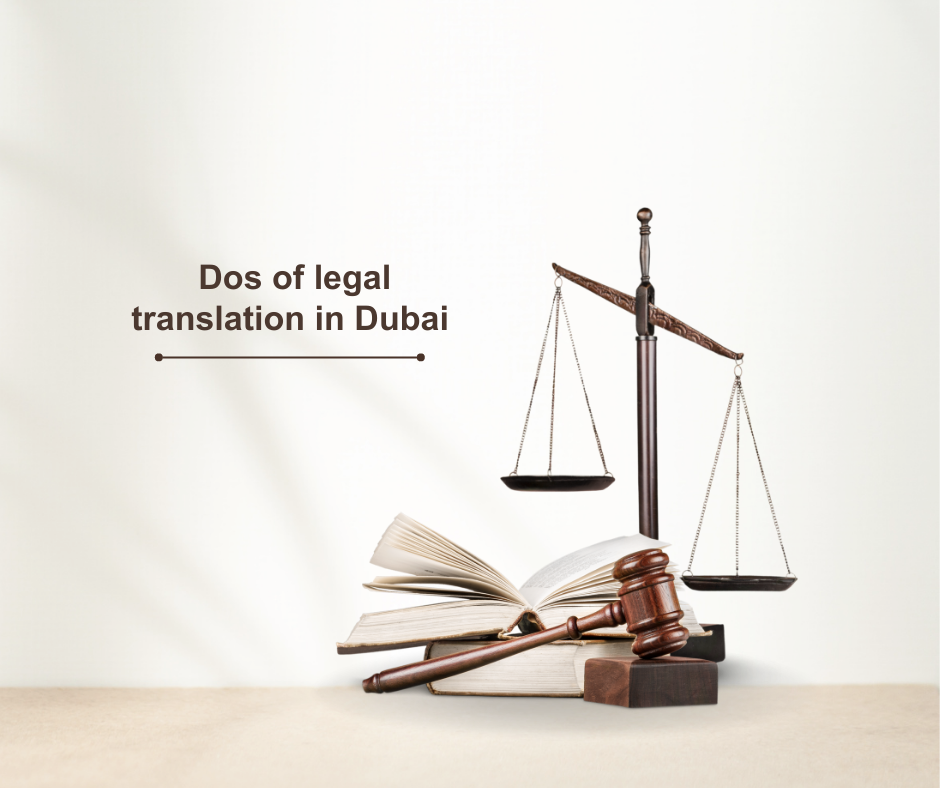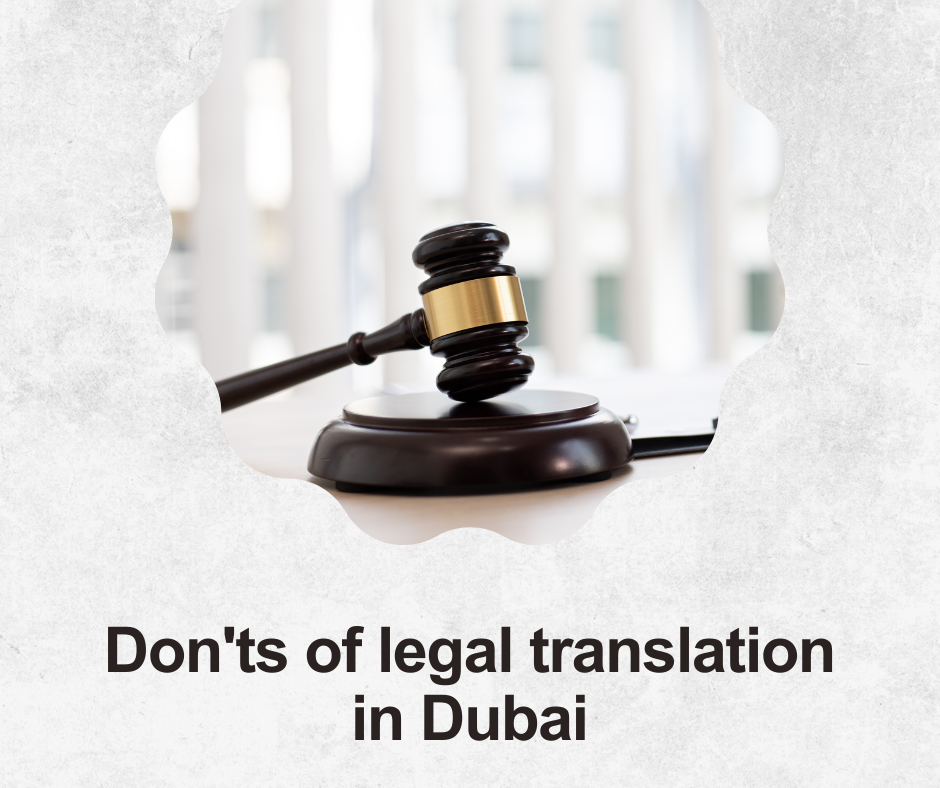Legal translation in Dubai requires fluency in multiple languages and a deep understanding of the legal systems involved to ensure that the intended meaning of legal documents is preserved across languages. This expertise is essential because mistranslations or inaccuracies can have serious legal consequences. To shed light on the intricacies of this process, this blog post aims to present a comprehensive list of dos and don’ts for translating legal documents. By following these guidelines, translators can navigate the challenges and complexities of legal translation in Dubai effectively.
Also know: Legal translation vs interpretation: understanding the difference
Contents
1- Dos of legal translation in Dubai:

Hiring a qualified legal translator
When seeking translation services for legal documents, hiring a translator with the qualifications and experience in legal translation is essential.
Look for translators who have obtained certifications or accreditations from recognized professional bodies in Dubai or internationally.
This ensures that the translator has undergone rigorous training and knows the intricacies of legal terminology and concepts.
Maintaining confidentiality
Legal documents often contain sensitive and confidential information that must be handled carefully.
It is imperative to select a translator who adheres to strict confidentiality protocols and prioritizes protecting the privacy of the documents.
To ensure confidentiality, it is recommended to have the translator sign a non-disclosure agreement (NDA) that legally binds them to maintain the confidentiality of the translated content.
Verifying legal terminology
Legal translation involves the accurate conveyance of specialized terminology used in legal contexts.
Ensure that the legal translator possesses a deep understanding of the legal systems and is well-versed in the legal terminology of the source and target languages.
This enables them to translate complex legal concepts accurately while maintaining the intended meaning and nuances.
Proofreading and reviewing
After the translation process is complete, conducting a thorough review and proofreading of the translated document is essential.
This step ensures that the final translated version is accurate and coherent and maintains the intended meaning of the original document.
By carefully reviewing the translated content, any potential errors, omissions, or inconsistencies can be identified and corrected, guaranteeing high accuracy and quality.
Considering cultural differences
Legal concepts and practices may vary across jurisdictions, and ensuring that the translated document is culturally appropriate and understandable for the target audience in Dubai is essential. Adapting the translation to align with the target audience’s cultural context helps avoid any misunderstandings or misinterpretations of the legal content, ensuring effective communication and compliance with local legal requirements.
Also know: Common legal translation mistakes and how to avoid them
2- Don’ts of legal translation in Dubai:

Relying on machine translation
While machine translation can provide a basic understanding, it often fails to capture the nuances and complex legal terminology necessary for accurate legal translation.
Therefore, avoiding machine translation and depending on human legal translation is advisable to ensure high-quality and precise results.
Using literal translations
Literal translations can create ambiguity and inconsistency within legal documents. Legal texts require clarity and precision to avoid misinterpretation or legal disputes. Using literal translations that do not accurately convey legal meaning can introduce inconsistencies and raise questions about the validity and enforceability of the translated document.
Omitting important details
When translating legal documents, it is imperative to include all relevant information in the translated document.
Neglecting to include crucial details can lead to misinterpretation or misunderstanding, potentially resulting in legal complications.
Therefore, thorough attention should be given to ensure that all pertinent information is accurately conveyed in the translation.
Rushing the translation process
Rushing through the translation process significantly increases the likelihood of errors and inaccuracies. To ensure the delivery of high-quality results, it is vital to allocate sufficient time for legal translation, thorough review, and meticulous proofreading. This allows for careful document examination, minimizing the risk of mistakes.
Ignoring formatting and layout
When translating legal documents, paying attention to the specific formatting and layout requirements typically found in such texts is essential.
Neglecting these requirements can result in translated legal documents that are perplexing and challenging to comprehend, potentially leading to errors and misunderstandings.
Professional legal translators should recognize the significance of adhering to formatting and layout guidelines and follow them meticulously throughout the translation.
Using informal language
Colloquialisms or informal expressions may not effectively convey the intended meaning within a legal context.
Adhering to a formal tone and language and a professional and precise style throughout the translation ensures that the document maintains its legal accuracy and authority.
Neglecting legal requirements
Certain legal documents may necessitate notarization or certification by relevant authorities. Therefore, ensuring that the translated document complies with all necessary legal formalities is essential, thus preserving its validity and authenticity within the legal framework.
Also know: The future of legal translation: Trends and innovations
Expert tips for choosing a professional legal translation agency
- Find an agency specializing in legal translation with professional translators having expertise in legal terminology and concepts.
- Ensure the agency works with native speakers of the target language who understand the source language and legal systems.
- Inquire about the agency’s quality assurance processes, including proofreading, editing, and review by experienced linguists.
- Prioritize confidentiality and security by selecting an agency with strict data protection policies and secure file transfer measures.
- Evaluate the agency’s experience through client testimonials, reviews, or case studies.
- Consider the pricing structure and turnaround time, but avoid low prices that may compromise quality. Compare quotes for a fair balance between cost, quality, and timeliness.
In conclusion, regarding legal translation, following the dos and avoiding the don’ts is essential for achieving accurate and high-quality results. Hiring a qualified legal translator with expertise in legal terminology and concepts is a fundamental step.
Maintaining confidentiality through non-disclosure agreements ensures the protection of sensitive information. Verifying legal terminology and conducting thorough proofreading guarantee accuracy and coherence. Cultural adaptation ensures effective communication and compliance with local legal requirements.
On the other hand, relying on machine translation, omitting essential details, rushing the process, ignoring formatting and layout, using informal language, and neglecting legal requirements can lead to errors, misunderstandings, and legal complications. By adhering to these guidelines, you can ensure precise and reliable legal translation services in Dubai.
Contact us today for accurate legal translation in Dubai – don’t settle for less!



